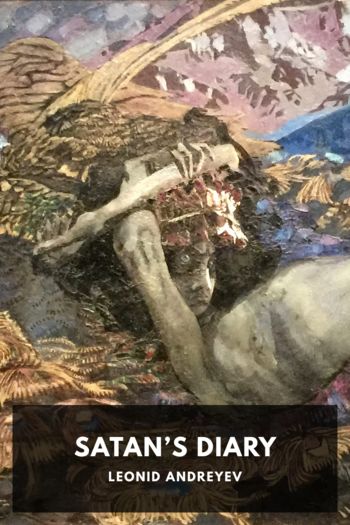Short Fiction - M. R. James (mobile ebook reader .txt) 📗

- Author: M. R. James
Book online «Short Fiction - M. R. James (mobile ebook reader .txt) 📗». Author M. R. James
About fifteen years ago, on a date late in August or early in September, a train drew up at Wilsthorpe, a country station in Eastern England. Out of it stepped (with other passengers) a rather tall and reasonably good-looking young man, carrying a handbag and some papers tied up in a packet. He was expecting to be met, one would say, from the way in which he looked about him: and he was, as obviously, expected. The stationmaster ran forward a step or two, and then, seeming to recollect himself, turned and beckoned to a stout and consequential person with a short round beard who was scanning the train with some appearance of bewilderment. “Mr. Cooper,” he called out—“Mr. Cooper, I think this is your gentleman”; and then to the passenger who had just alighted, “Mr. Humphreys, sir? Glad to bid you welcome to Wilsthorpe. There’s a cart from the Hall for your luggage, and here’s Mr. Cooper, what I think you know.” Mr. Cooper had hurried up, and now raised his hat and shook hands. “Very pleased, I’m sure,” he said, “to give the echo to Mr. Palmer’s kind words. I should have been the first to render expression to them but for the face not being familiar to me, Mr. Humphreys. May your residence among us be marked as a red-letter day, sir.” “Thank you very much, Mr. Cooper,” said Humphreys, “for your good wishes, and Mr. Palmer also. I do hope very much that this change of—er—tenancy—which you must all regret, I am sure—will not be to the detriment of those with whom I shall be brought in contact.” He stopped, feeling that the words were not fitting themselves together in the happiest way, and Mr. Cooper cut in, “Oh, you may rest satisfied of that, Mr. Humphreys. I’ll take it upon myself to assure you, sir, that a warm welcome awaits you on all sides. And as to any change of propriety turning out detrimental to the neighbourhood, well, your late uncle—” And here Mr. Cooper also stopped, possibly in obedience to an inner monitor, possibly because Mr. Palmer, clearing his throat loudly, asked Humphreys for his ticket. The two men left the little station, and—at Humphreys’ suggestion—decided to walk to Mr. Cooper’s house, where luncheon was awaiting them.
The relation in which these personages stood to each other can be explained in a very few lines. Humphreys had inherited—quite unexpectedly—a property from an uncle: neither the property nor the uncle had he ever seen. He was alone in the world—a man of good ability and kindly nature, whose employment in a Government office for the last four or five years had not gone far to fit him for the life of a country gentleman. He was studious and rather diffident, and had few out-of-door pursuits except golf and gardening. Today he had come down for the first time to visit Wilsthorpe and confer with Mr. Cooper, the bailiff, as to the matters which needed immediate attention. It may be asked how this came to be his first visit? Ought he not in decency to have attended his uncle’s funeral? The answer is not far to seek: he had been abroad at the time of the death, and his address had not been at once procurable. So he had put off coming to Wilsthorpe till he heard that all things were ready for him. And now we find him arrived at Mr. Cooper’s comfortable house, facing the parsonage, and having just shaken hands with the smiling Mrs. and Miss Cooper.
During the minutes that preceded the announcement of luncheon the party settled themselves on elaborate chairs in the drawing-room, Humphreys, for his part, perspiring quietly in the consciousness that stock was being taken of him.
“I was just saying to Mr. Humphreys, my dear,” said Mr. Cooper, “that I hope and trust that his residence among us here in Wilsthorpe will be marked as a red-letter day.”
“Yes, indeed, I’m sure,” said Mrs. Cooper heartily, “and many, many of them.”
Miss Cooper murmured words to the same effect, and Humphreys attempted a pleasantry about painting the whole calendar red, which, though greeted with shrill laughter, was evidently not fully understood. At this point they proceeded to luncheon.
“Do you know this part of the country at all, Mr. Humphreys?” said Mrs. Cooper, after a short interval. This was a better opening.
“No, I’m sorry to say I do not,” said Humphreys. “It seems very pleasant, what I could see of it coming down in the train.”
“Oh, it is a pleasant part. Really, I sometimes say I don’t know a nicer district, for the country; and the people round, too: such a quantity always going on. But I’m afraid you’ve come a little late for some of the better garden parties, Mr. Humphreys.”
“I suppose I have; dear me, what a pity!” said Humphreys, with a gleam of relief; and then, feeling that something more could be got out of this topic, “But after all, you see, Mrs. Cooper, even if I could have been here earlier, I should have been cut off from them, should I not? My poor uncle’s recent death, you know—”
“Oh dear, Mr. Humphreys, to be sure; what a dreadful thing of me to say!” (And Mr. and Miss Cooper seconded the proposition inarticulately.) “What must you have thought? I am so sorry: you must really forgive me.”
“Not at all, Mrs. Cooper, I assure you. I can’t honestly assert that my uncle’s death was a great grief to me, for I had never seen him. All I meant was that I supposed I shouldn’t be expected to take part for some little time in festivities





Comments (0)